#posttraumatic stress disorder
Text
Idk if anyone's posted this before but if you want a good primer on ACEs (adverse childhood experiences) please check out this online course. It's free & only 50 minutes, plus you get a certificate once you're done. I really recommend it for everyone. Especially because not many people understand dissociation and childhood trauma even though the basic information is right here.
#adverse childhood experiences#dissociation#childhood trauma#actuallyptsd#actuallydid#actuallydissociative#dissociative identity disorder#posttraumatic stress disorder#complex trauma#trauma informative
190 notes
·
View notes
Text
So I wrote this for @sleepdeprivedsimp234
Mass was working on his computer when Texas found him in the middle of the night. It wasn’t strange for him to be up this late, but it was for Texas. It was that much that got a look from Mass.
“You okay?” Mass asked, raising his eyebrows slightly.
Texas nodded. “Just couldn't sleep is all,” he said.
He couldn't help but take another look at Mass, however. Usually, he wouldn't think anything of the fact that he was up this late, but there was something in his voice that sounded… off. Was there something wrong?
That's when Texas noticed how tense Mass’s shoulders were, how his hands seemed to shake slightly as he worked at his computer.
“Are you okay?” Texas asked, his eyes narrowing.
“I'm fine. Just couldn't sleep,” Mass said with a shrug. Texas was about to protest when Mass continued. “I'm fine Texas! I promise you I'm fine.”
Texas sighed and nodded. He couldn't say he was exactly surprised that Mass had refused to say if something was up, especially if something was. It wouldn't have been the first time.
“Alright. I'm gonna be here anyway, so-”
“The problem’s that I'm fine, isn't it? That they didn't get to live and I did?” Mass said, his voice shaking slightly. “They didn't get out of that war, but I did. They should’ve been able to get home, and it's my fault.”
Texas shook his head. “It's not your fault, Mass,” he whispered, taking the seat next to him at the table. He carefully placed a hand on Mass’s shoulder, trying to be as reassuring as he could be. “I'm sure they wouldn't blame you.”
Mass looked away from Texas. No matter how much he tried, he couldn't convince himself it wasn't his fault. “They got hurt because of me. If I hadn't started that war-” He trailed off, shaking his head slightly. “Why won't it stop?”
Texas squeezed Mass’s shoulder for a moment, sighing. Mass hadn't been this honest with him in a long time, and he just wanted to make sure he'd be okay.
“Why won't what stop?” Texas asked, his voice gentle.
“The guilt. Why won't it stop?” Mass's voice sounded distraught as he wiped at his face.
Texas shook his head. "I don't know, Mass. I don't know if it'll ever just stop." Carefully, he pulled Mass into a hug, leaning his head on top of Mass’s. "It sucks. I'm so sorry you have to deal with this."
Mass's eyes shut tightly as his arms wrapped around Texas. He just hoped that he wouldn't have to leave anytime soon.
Texas was just glad that Mass didn't try to leave then. He knew he'd try to make sure that things ended up okay.
#wttt#welcome to the table#welcome to the statehouse#wttsh#fanfic#fanfiction#my writing#ptsd#post traumatic stress disorder#posttraumatic stress disorder#massachusetts#texas
24 notes
·
View notes
Photo
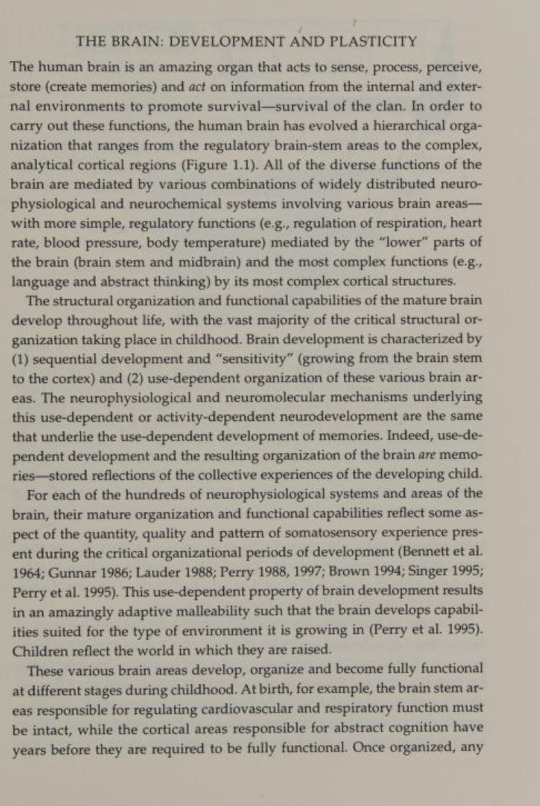
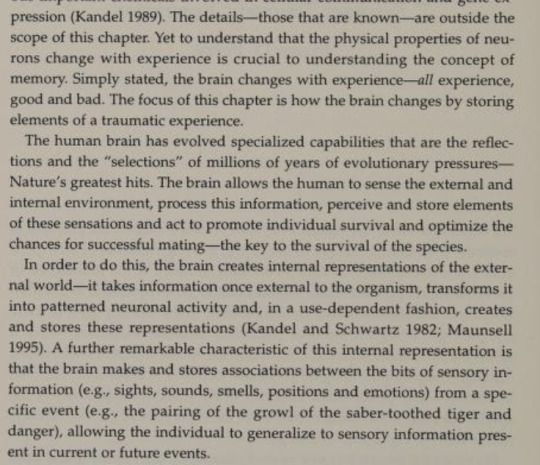
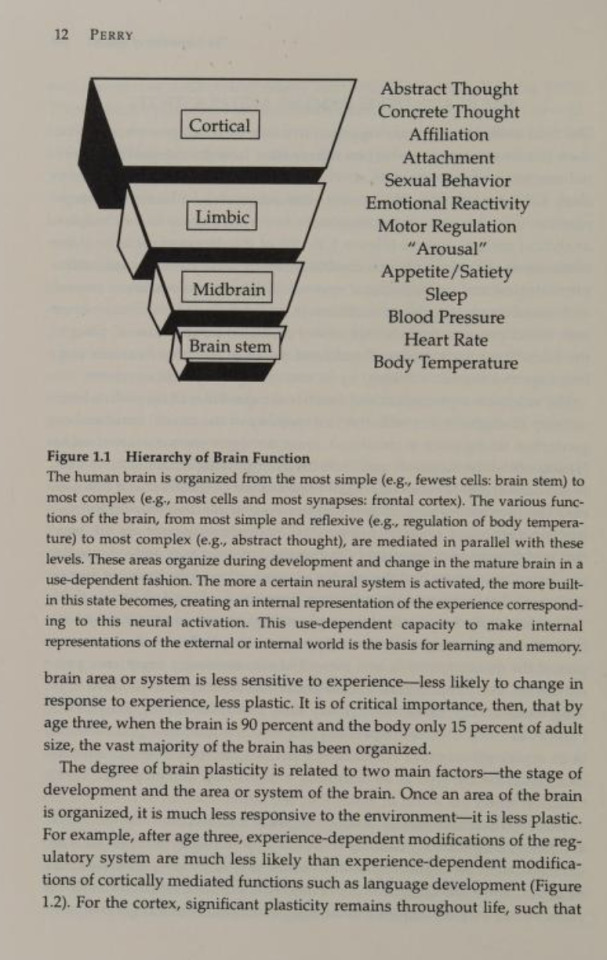
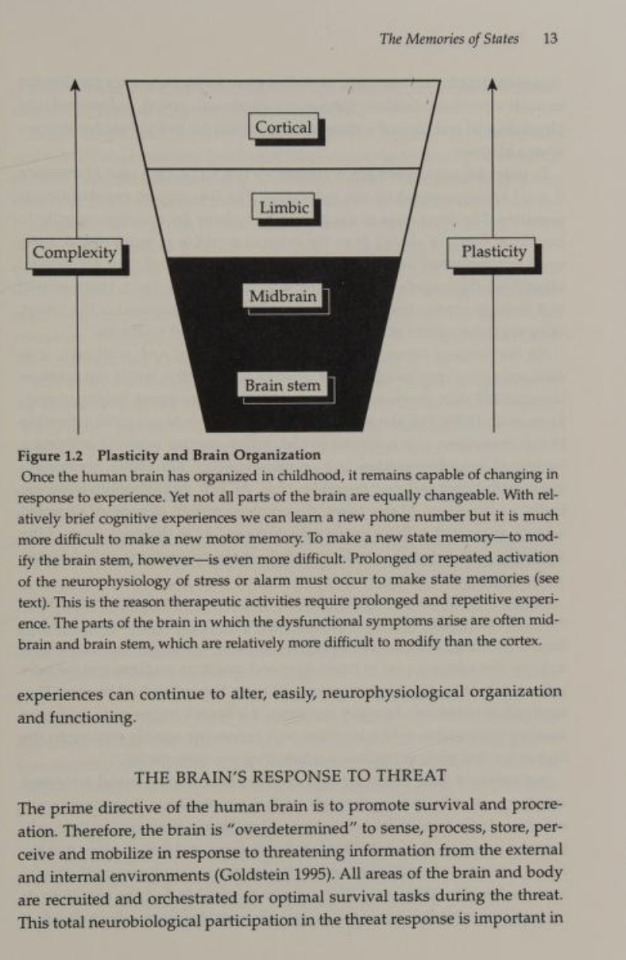
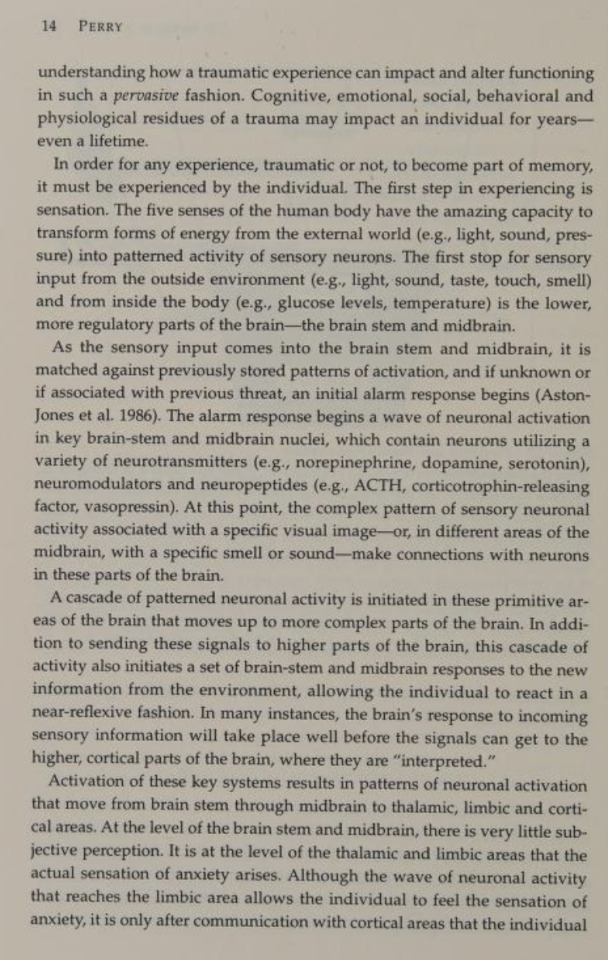
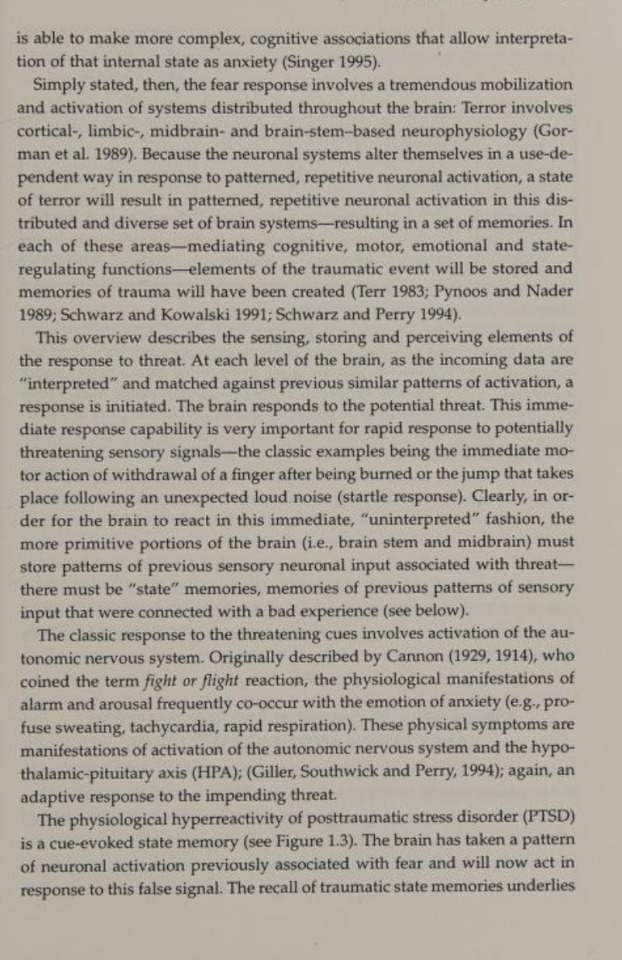
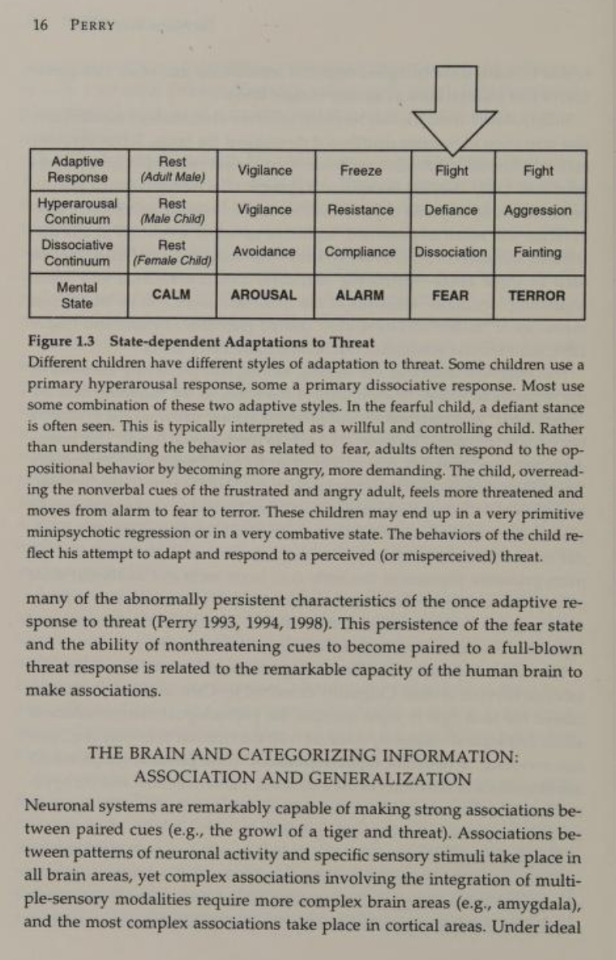
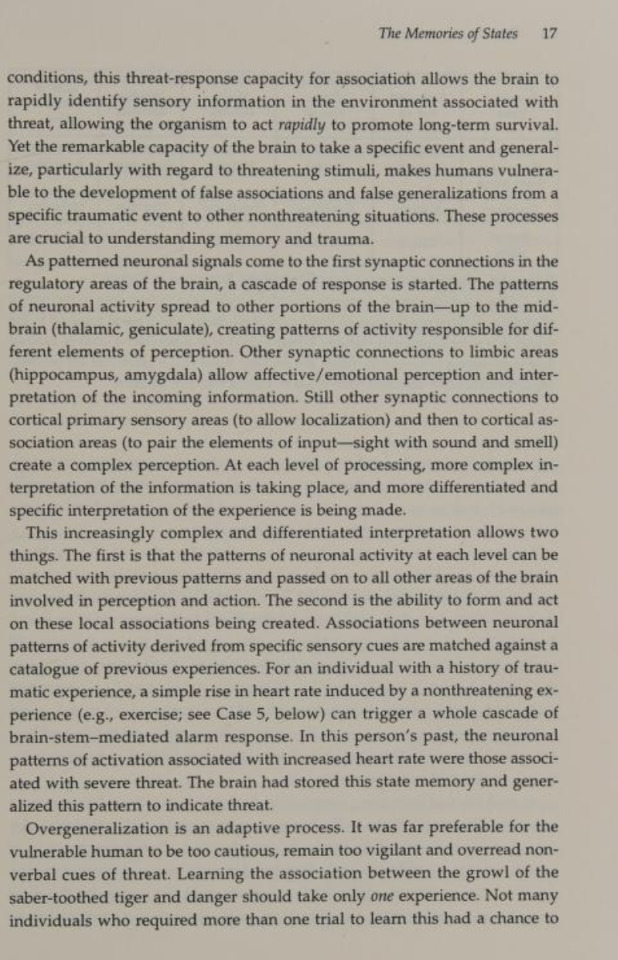
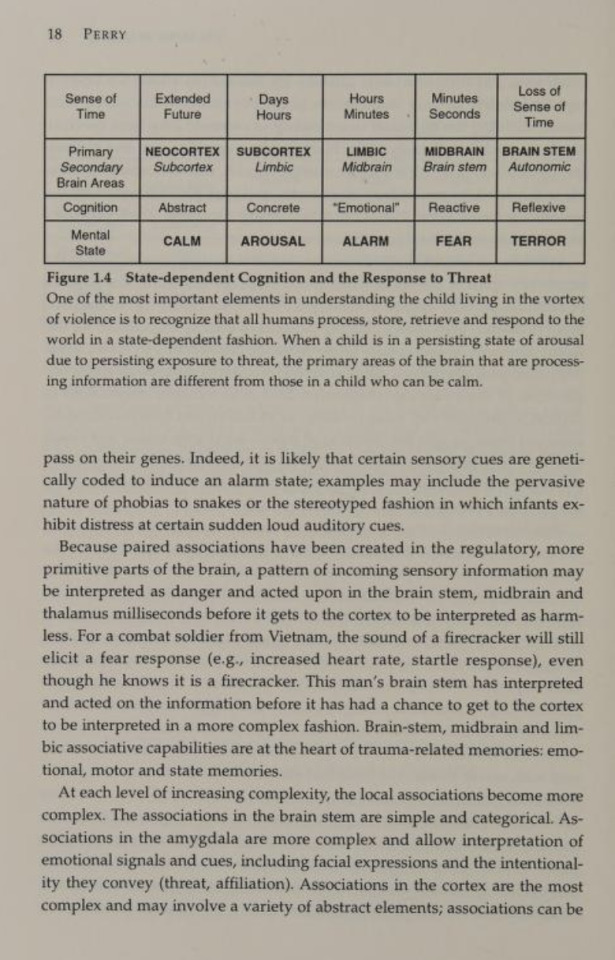

From Splintered Reflections: Images of the Body in Trauma (full text here) by Jean Goodwin and Reina Attias
#trauma#ptsd#Posttraumatic Stress Disorder#psychology#neuroscience#mental health#memory#project#text#literature#jean goodwin#reina attias#full text#books
130 notes
·
View notes
Text
Trauma talk: wounds are not the same. Even from the same sources, your wounds won't always be the same, act the same, or heal the same. The things that happen to you will echo in your nervous system and impact different aspects at different levels, like a spray of bullets in different directions. Some wounds are shallow, some are deep. It's important to know how to take care of each one.
Some things are kind of like bruises: they're tender and sore to the touch, but you can touch them, and they'll clear up after a little bit. Some wounds are more like scabs: you can touch it and it feels fine, but then if you touch it too much, it'll break open, and you'll bleed.
And some wounds are like broken bones. They will take a long time to heal, and immense support to make sure it cannot grow worse. Even after it heals and the cast comes off, it will be tender and you will feel more fragile with it. Healed does not mean back to the way that it was before.
You will be different, but you will not be broken anymore.
Tender, but not broken.
Trauma leaves marks. But they will heal. They may not heal the same way, or take the same time to, or be anything like they were before. But they will heal. You will heal. Breathe.
#mental health#mental health awareness#ptsd#posttraumatic stress disorder#trauma#trauma survivor#trauma quotes#trauma reminder
31 notes
·
View notes
Text
i am scared
January 30, 2024
I feel like I am losing my mind. Thoughts of harm to myself are flying through my head. I feel like I am pushing everyone away as they try to help me.
I feel so broken.
I survived so long without getting to this point, why now? What if I don’t come back?
What if everyone gets tired of me being like this? Will they all leave?
My meds were working really well, what is…

View On WordPress
#academia#anxiety#broken#caretaking#childhood trauma#Depression#headache#Insecure#life changes#medication#migraine#posttraumatic stress disorder#ptsd#survive#trauma
2 notes
·
View notes
Text
Mickey's Descent Into Madness
Mickey’s Descent Into Madness
What Is It?
The YouTube video Mickey’s Descent Into Madness by the YouTube channel Ethereal Snake:
Here is the description for this video:
Support the channel and get access to the soundtrack Patreon : https://www.patreon.com/Ethereal_Snake
Merch : https://www.redbubble.com/people/Ethe…
PayPal.me : https://paypal.me/tombourgeois87
Twitter :…

View On WordPress
#A Fox In Space#Animation#Ethereal Snake#MeatCanyon#Mickey#Mickey Mouse#Mickey&039;s Descent Into Madness#Posttraumatic Stress Disorder#PTSD#The Minute Hour#Tom Bourgeois#Tommy Hurst#Video#Vietnam War
8 notes
·
View notes
Text
PTSD: Post-traumatic stress disorder
PTSD: Post-traumatic stress disorder
What Is PTSD?
Posttraumatic stress disorder (PTSD), once called shell shock or battle fatigue syndrome, is a serious condition that can develop after a person has experienced or witnessed a traumatic or terrifying event in which there was serious physical harm or threat. PTSD is a lasting consequence of traumatic ordeals that cause intense fear, helplessness, or horror. Examples of things that…
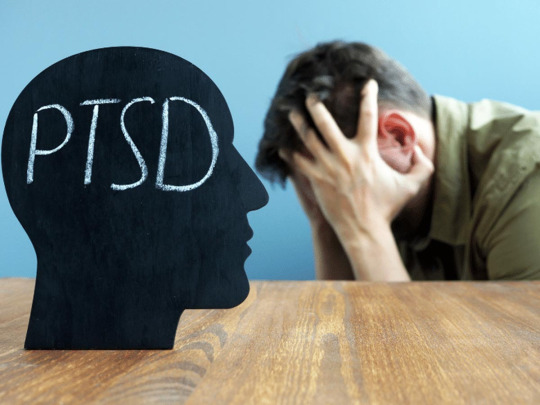
View On WordPress
2 notes
·
View notes
Text
Mental Illness: How Much Do You Really Know About It?
Mental illness is something we as a society do not really talk about openly if at all. There is such a stigma around the topic; but for no good reason other than people who suffer with a mental illness may act, talk, or think differently than the norm.
They, unfortunately, have little to no control over these actions so they suffer needlessly because we choose to attach that stigma to them and…

View On WordPress
#anxiety#Bipolar disorder#depression#Mental disorder#Mental Health#mental health quiz#mental illness#Personality Disorders#Posttraumatic stress disorder#Schizophrenia#stigma#stigma of mental illness
1 note
·
View note
Text
#post traumatic stress disorder#pandemic#post-traumatic stress disorder#post pandemic stress disorder#post pandemic stress disorder ppsd#post pandemic stress#post-pandemic stress disorder#post traumatic stress disorder treatment#stress#posttraumatic stress disorder#post pandemic#post pandemic world#coronavirus pandemic#post pandemic social anxiety#social anxiety post pandemic#post traumatic stress#dealing with social anxiety post pandemic
0 notes
Text
why has tumblr discourse circled back around into "you can't expect people to accommodate your needs or triggers if they're anything out of the ordinary"
#idc that you have ptsd yr being fucking ableist saying ppl cant ask for ppl to not discuss or show certain triggers around them.#sincerely someone who *also* has ptsd#sorry you're lucky your triggers are all Neurotypical Approved but not all of us fucking are#some of us are triggered by butterflies and beatles music and that's?! just how ptsd fucking WORKS.#we're not being selfish by asking people to accommodate us and again i don't care if you have ptsd too you are spouting#LITERAL ABLEISM. by calling our needs insane and selfish#im triggered by jjba and butterflies and elvis and certain names#the public library down the street. the middle and high school i went to#the sound of a specific voice#calico cats and suicide threats and being held too tight and hamilton.#im not being fucking selfish by asking people to avoid jjba references around me#to not send me songs or images or? threaten suicide? or play hamilton aloud or hold me too tight#i have a friend who's triggered by smiley faces. they're not doing anything wrong asking me to not use them in texts with them#i know someone who's triggered by the beatles. there is nothing wrong with it expressing that so i don't play that around it.#and the fact that you're arguing it as this. inane childish unreasonable behavior#no way around it#is cruel ableism against posttraumatic stress disorder that is NOT negated by you having triggers too.#don't fucking turn it on those of us with 'weird' triggers.#just say you're fucking ableist because being mentally ill does not excuse this shit behavior toward people in the same situation.
5 notes
·
View notes
Text
Who can access Panchakarma therapy for mental wellness?
In recent years, there has been a growing interest in holistic approaches to mental wellness, and one such practice gaining traction is Panchakarma therapy. Originating from ancient Ayurvedic traditions, Panchakarma therapy involves a series of cleansing and rejuvenating treatments aimed at restoring balance to the body and mind. While traditionally used to treat physical ailments, there is increasing recognition of its potential benefits for mental health conditions. However, understanding who can access Panchakarma therapy for mental wellness is crucial for individuals seeking alternative approaches to mental well-being.
Panchakarma therapy encompasses a range of techniques, including massage, herbal treatments, dietary changes, and detoxification procedures. These treatments are tailored to each individual's unique constitution and health concerns, making it a personalized approach to mental wellness. While Panchakarma therapy is generally safe for most individuals, there are certain factors to consider when determining eligibility for this treatment modality.
Assessment by Ayurvedic Practitioner: The first step in accessing Panchakarma therapy for mental wellness is to undergo a comprehensive assessment by a qualified Ayurvedic practitioner. This assessment typically involves an evaluation of one's physical health, mental well-being, lifestyle factors, and medical history. Based on this assessment, the practitioner can determine whether Panchakarma therapy is suitable and beneficial for the individual.
Overall Health Status: Individuals with certain underlying health conditions may need to proceed with caution or avoid certain aspects of Panchakarma therapy. For example, pregnant women, individuals with severe medical conditions, or those undergoing intensive medical treatments may not be ideal candidates for Panchakarma. It's essential to discuss any existing health concerns with the Ayurvedic practitioner to ensure safety and efficacy.
Commitment to Lifestyle Changes: Panchakarma therapy often involves not only in-clinic treatments but also lifestyle modifications, including dietary changes, herbal supplements, and daily routines. Individuals seeking Panchakarma therapy for mental wellness should be willing to commit to these lifestyle changes to maximize the benefits of the treatment.
Mental Health Assessment: Since Panchakarma therapy for mental wellness focuses on restoring balance to the mind-body connection, individuals with mild to moderate mental health concerns such as stress, anxiety, depression, or insomnia may benefit from this approach. However, those with severe mental health conditions may require a multidisciplinary treatment approach involving Panchakarma therapy alongside conventional psychiatric care.
Personalized Treatment Plan: Panchakarma therapy is not a one-size-fits-all approach. Each individual's treatment plan is tailored to their specific needs, constitution, and wellness goals. Therefore, it's essential to work closely with the Ayurvedic practitioner to develop a personalized treatment plan that addresses mental health concerns effectively.
Accessing Panchakarma therapy for mental wellness offers several potential benefits
Stress Reduction: Panchakarma treatments such as Abhyanga (oil massage) and Shirodhara (oil dripping on the forehead) can help alleviate stress and promote relaxation, leading to improved mental well-being. This aligns with the concept of stress management therapy.
Detoxification: Panchakarma therapies like Virechana (purgation) and Basti (enema) are designed to eliminate toxins from the body, which can have a positive impact on mental clarity and emotional balance. This can be particularly beneficial for individuals seeking post-traumatic stress disorder treatment.
Balancing Doshas: According to Ayurveda, imbalances in the three doshas (Vata, Pitta, and Kapha) can contribute to mental health issues. Panchakarma therapy aims to restore doshic balance, thereby addressing underlying causes of mental distress.
In conclusion, Panchakarma therapy can be a valuable tool for promoting mental wellness, but it's essential to determine eligibility based on individual health status, mental health concerns, and willingness to commit to lifestyle changes. By working with a qualified Ayurvedic practitioner and following a personalized treatment plan, individuals can access the benefits of Panchakarma therapy for improved mental well-being. For those seeking Panchakarma treatment in Delhi, options such as Ayurvedic hospitals like Patanjali Hospital Delhi can provide access to experienced practitioners and comprehensive treatment plans tailored to individual needs.
#Panchakarma Treatment#stress management therapy#Posttraumatic stress disorder treatment#Ayurvedic hospital in delhi#patanjali hospital delhi
0 notes
Text
How to Overcome Stress and Find Inner Peace
Life has a sneaky way of piling things on, doesn’t it? One moment you’re breezing through your to-do list, and the next, you’re wondering why you got misty-eyed over a cereal commercial. It’s wild out there, so it’s totally okay to need a little time-out every now and then. For those times when you’re not quite sure if you’re just tired or on the brink of a meltdown, here’s a fun (but oh-so-real) list of signs that stress might be doing the tango on your last nerve.
Sleep? What’s That?
If you hop into bed and your brain decides to replay every episode of your life instead of letting you snooze, stress could be the uninvited sleepover guest. Try some lavender mist on your pillow or Naturecan’s CBD gummies to help you chill out before bed and see if that helps.
Coffee Can’t Fix This
We all have our morning rituals, but if you’re guzzling down cup after cup and still feeling like you’re in slow-mo, it’s a sign all might not be well in your body and mind.
You’re Suddenly Tearful
Ever find yourself getting teary at the drop of a hat? Yep, even over those weird infomercials. Stress can turn those tear ducts into open faucets. It’s much harder to regulate your emotions when you are under a lot of stress, which is why seeing a good therapist can often be a great idea.
Your Belly’s Upset
If your stomach’s acting like it’s on a rollercoaster when you’re firmly on solid ground, stress might be steering the ride. Butterflies in the stomach can be a sign of stress and anxiety, but they can also be a sign of something physically wrong with you too, so if they persist best to get them checked out.
A Case Of Forgetfulness
Ever read a page of a book and then had no clue what you just read? Or forgot why you opened the fridge? When stress levels rise, memory can take a nosedive. So, before you start panicking about cognitive decline issues, think about whether you have been feeling particularly stressed lately.
Your Skin’s Not Playing Nice
When you’re adulting, but your skin decides to revert to its teen years, it’s time to check in with your stress levels. A good therapist may well be better for you than a dermatologist at this point.
Everything Feels Overwhelming
The mail’s piled up, the laundry’s giving you side-eye, and even choosing a snack feels like a major decision. If the small stuff feels like climbing a mountain, it’s time to take a breath, and think about whether you might need some help for your stress.
Obviously, if you think you might have a stress problem, you should visit your doctor as soon as possible. This information is just a general summary and only a medical professional can diagnose chronic stress in you. That being said, fi you do spot any of these signs, you should act sooner, rather than later.
#stress#heat stress#rashes from stress#rash from stress#hives with stress#post traumatic stress disorders#stress test#stress nuclear test#stress ball#post trauma stress disorder#stress fracture#nuclear stress testing#synonyms for stress#relief stress#posttraumatic stress disorder treatment#stress incontinence#incontinence stress#stress bump on finger#eu stress#stress symptoms#out stress#stress definition#psychologist stress#the definition of stress#critical incident stress debriefing#oxidative stress#stress out lyrics#stress out#stress is#stress management 2
1 note
·
View note
Link
Chapters: 1/1
Fandom: Welcome To The Table - Ben Brainard (Web Series)
Rating: Teen And Up Audiences
Warnings: Creator Chose Not To Use Archive Warnings
Characters: New Jersey (Welcome To The Table), CDC (Welcome To The Table)
Additional Tags: New Jersey has ptsd, CDC is a doctor, New Jersey has nightmares, Post-Traumatic Stress Disorder - PTSD
Summary:
New Jersey has a checkup with CDC. He ends up asking hypotheticals about someone who has symptoms of PTSD. CDC sees through the hypotheticals and checks on New Jersey.
#wttt#welcome to the table#wttsh#welcome to the statehouse#new jersey#cdc#ptsd#posttraumatic stress disorder#post traumatic stress disorder#new jersey has ptsd
10 notes
·
View notes
Text
Y'all really need to learn about DID more outside the context of alters. DID is not just "disordered plurality" - It is a developmental disorder, an attachment disorder, a posttraumatic stress disorder. It is comorbid with many other issues, such as somatic pain syndromes, physical health issues, and a variety of mental illnesses. It is a complex organization of symptoms related to the disrupted healthy development of a child, both in terms of their body and their mind. It is not just about the alters.
4K notes
·
View notes
Text
New sibling diagnosis for post-traumatic stress disorder -- ScienceDaily
New sibling diagnosis for post-traumatic stress disorder — ScienceDaily
The World Health Organization (WHO) recently listed a new sibling diagnosis for post-traumatic stress disorder (PTSD), termed complex post-traumatic stress disorder (CPTSD). An international team with the involvement of the University of Zurich has now summarized the symptoms of the long-awaited new diagnosis and issued guidelines for clinical assessment and treatment.
One of the most widely…

View On WordPress
0 notes
Text
emotional binoculars
i wish i wasn't this wayi can't be sure i was born like thisbecause all my memories are stained with the emotions of othersspecifically, hersi see mine as wellscared, uncertainimpending doomthere was no safety in my attachmentso i clung to the flaming astroid in orbit-i cling to myselfmuscles tenseintestines clenchsomulencean emotional thermometer,barometer,binocularsreading the roomof its limbic…

View On WordPress
1 note
·
View note